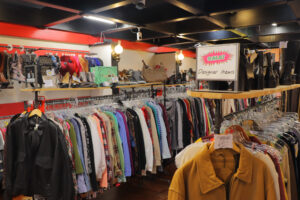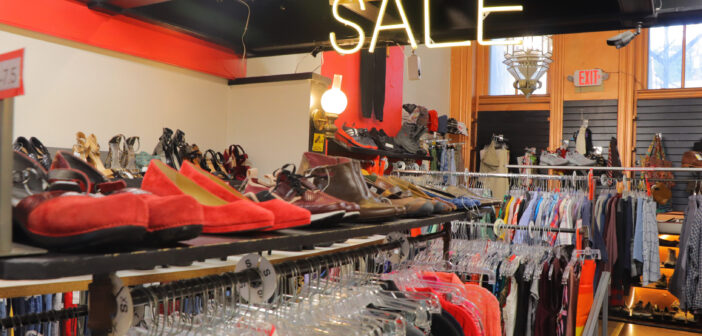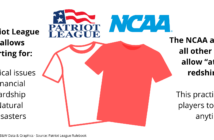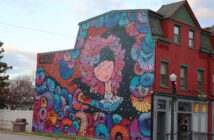Over 100 billion garments are produced each year by the fashion industry.
According to earth.org, over 101 million tons of these garments end up in landfills.
In addition to this waste, campus sustainability analyst Keegan Schealer said the fashion industry has many negative impacts, particularly due to fast fashion.
Unsustainable fashion, he said, can result in animal suffering, water pollution, carbon emissions and toxic byproducts.
As a community, Schealer said it is important to ensure products are distributed in a way that minimizes fossil fuel emissions, but this is often difficult when clothes are shipped worldwide.
One way to do this is clothing recycling, which can take the form of upcycling, estate sales and thrift, vintage, or consignment stores.
“Thrifting and buying local are especially important,” he said.
The Lehigh Valley offers a variety of thrift stores and consignment shops. Some of these local operations work to promote inclusive fashion while others support social causes. All, however, promote sustainability.
The 330 Thrift
Michele Jurkowski owns The 330 Thrift, located at 1421 Center St., is a resale boutique that sells men’s and women’s clothing, shoes and accessories of a large size range between $3 and $10.
She said much of the inventory is composed of pieces from her own wardrobe, donations from family and community members, and used items she purchased.
In addition to a love for thrifting, which she said she has done all her life, sustainability is one of Jurkowski’s main reasons for owning the store.
“For the stuff that goes into the landfill, clothing is one of the biggest things and it takes like 40,000 years for it to disintegrate,” Jurkowski said. “So it’s really, really bad for our environment, but reselling is very, very good for our economy.”
The inventory is not the only repurposed thing in The 330 Thrift. Jurkowski said everything in the boutique is recycled, except for the clothing racks, including a cabinet she garbage picked and refinished.
She said she has always been passionate about clothing recycling, and she thinks thrift shops are a tool that can better the Bethlehem community.
The Attic
The Attic, located at 516 Main St. in Bethlehem, sells and accepts consignment pieces.

The Attic Bethlehem has designated designer clothing racks for second-hand designer items on Feb. 28, 2023. The sustainable clothing store sells handbags, clothing, shoes, jewelry and other accessories. (Adeline Horan/B&W Staff)
Michele Osztrosits, general manager of the Attic, said the consigner of any sold item receives 50% of the profit from their item. Items that are not picked up during the 60-day consignment period are taken by the Salvation Army to ensure no clothing goes to waste.
Osztrosits said the inventory is carefully curated, researched and checked for condition. The Attic offers a unique and diverse collection of items that usually fall between $7 and $20.
“I just think, as a society, we don’t need more clothing,” Osztrosits said.
My Sister’s Closet

At My Sister’s Closet, clean and in-style clothes are neatly organized by category, color and size. Customers can pick their favorite clothes accordingly. (Junying Wu/B&W Staff)
My Sister’s Closet, a resale boutique located on Nazareth Pike, uses all its proceeds to fund Bloom, an organization that provides emergency shelter and rehabilitation for victims of sexual trafficking and sexual exploitation in the Lehigh Valley.
Employee Kate Harris said all the clothing at My Sister’s Closet has been donated. The shop allows survivors to pick out clothing on visits to the store, and it sells jewelry made by one survivor.
Harris said the staff gives donations that are unsuitable to be sold to other local organizations, such as Safe Harbor, a shelter for people experiencing homelessness.
Harris said the core of My Sister’s Closet is its volunteers.
“It’s a great sisterhood,” Harris said. “The women who work and volunteer here are all really lovely people and are really passionate about our mission.”
Swap Shop
The Lehigh community does not even have to leave campus to find sustainable fashion opportunities. The Office of Sustainability hosts the Swap Shop, a free thrift shop where students can donate their clothing.
Manager Jennifer Liu, ‘23, said they host 5×10 events in the fall to inform first-year students about the shop, and they hold donation drives, pop-up events and DIY upcycling events in the spring.
As an eco-rep, Liu said she values sustainability and wants people to be aware of how their actions impact the environment. She hopes to educate the community about the Swap Shop and the office’s other initiatives.
“People tend to go for fast fashion a lot, and they aren’t aware of how much waste they create when they purchase bad quality clothing,” Liu said. “They also just wear it once or twice and then they just throw it away.”






Comment policy
Comments posted to The Brown and White website are reviewed by a moderator before being approved. Incendiary speech or harassing language, including comments targeted at individuals, may be deemed unacceptable and not published. Spam and other soliciting will also be declined.
The Brown and White also reserves the right to not publish entirely anonymous comments.